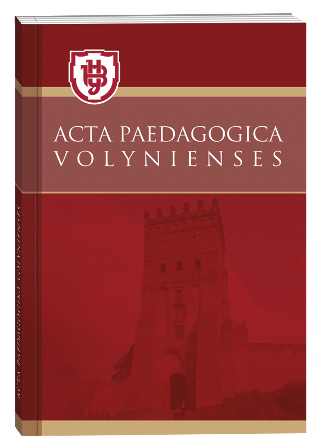РОЛЬ МЕНТОРСТВА У ВДОСКОНАЛЕННІ ПРОФЕСІЙНОЇ КОМПЕТЕНТНОСТІ МАЙБУТНІХ УЧИТЕЛІВ ПОЧАТКОВОЇ ОСВІТИ
DOI:
https://doi.org/10.32782/apv/2024.1.9Ключові слова:
професійний досвід, мотивація студентів, самостійність, соціальна відповідальність, комунікативні навички, творче мислення, менторство, механізми менторства.Анотація
У статті актуалізована проблема менторства та механізми її застосування у вдосконаленні професійної компетентності майбутніх учителів початкової освіти. Досягнути мету роботи стало можливим внаслідок використання загальнотеоретичних методів аналізу, спостереження та розрахунків коефіцієнту результативності. Обґрунтовано, що позитивний вплив менторства пов’язаний із розвитком навичок спілкування, можливістю усунути прогалини в знаннях, більш детальним вивченням матеріалу, підвищенням мотивації студентів до навчальної діяльності, використанням інноваційних підходів в освітньому процесі. Встановлено, що негативний вплив менторства може проявлятися лише внаслідок відсутності соціальної відповідальності студентів та недостатньої компетентності менторів. Розробка механізмів навчання майбутніх вчителів початкових класів із залученням менторів включала в себе підвищення рівня теоретичних знань, розвиток практичної професійної компетентності, комунікативних навичок, творчого мислення. У навчанні також було передбачено використання цифрових технологій Twiddla, SlideDog. Під час дослідження, на основі коефіцієнту результативності, було доведено, що високий рівень знань досягнуто серед 67% студентів із показником 1,91; достатній – 29% із показником 1,73; середній – 4% із показником 1,30. Високі результати пов’язані із забезпеченням детального опрацювання теми та визначенням механізмів для вільного використання навчального матеріалу. Доведено, що ментори також підвищили рівень професійної компетентності, що відобразилося у формуванні додаткових навичок (глибоких знань у професійній діяльності, розвитком комунікації та творчих підходів у науковій діяльності). На основі отриманих даних зроблено висновок щодо ефективності реалізації механізмів менторства у професійній підготовці майбутніх вчителів початкових класів. Метою публікації є обґрунтування ролі менторства, розкриття механізмів впливу менторської практики на вдосконалення професійних компетентностей майбутніх учителів початкових класів. Перспективами подальших досліджень є пошук ефективних шляхів реалізації механізмів менторства у розвитку професійних знань студентів, створення раціональних менторських програм для підготовки висококваліфікованого, конкурентоздатного фахівця.
Посилання
Безлюдна Н. В., Дудник Н. В. Підготовка майбутнього вчителя початкової школи до проходження педагогічної практики в умовах дистанційного навчання. Психолого-педагогічні проблеми сучасної школи. 2021. Вип. 1, № 5. С. 26–32.
Ворожбіт-Горбатюк В. В. Предметно-методична компетентність вчителя через призму менторингу в закладі освіти / В. В. Ворожбіт-Горбатюк, А. В. Боярська-Хоменко, С. О. Доценко. Академічні студії. Серія: Педагогіка. 2021. Вип. 3, № 2. С. 133–139.
Гарань Н. (2023). Розвиток «soft skills» студентської молоді у закладі вищої освіти в умовах дистанційного навчання / Н. Гарань, В. Замороцька, К. Колесник. Гуманізація навчально-виховного процесу. 2023. Вип. 1, № 103. С. 23-32.
Дрокіна А. С. Використання технологій доповненої реальності як ефективного засобу реалізації STEM-освіти майбутніми вчителями початкової школи. Академічні візії. 2023. Вип. 25. С. 1-9.
Лук’янченко О. Естетичні засади формування іміджу майбутнього вчителя НУШ. Актуальнi питання гуманiтарних наук. 2022. Вип. 47, № 3. С. 202-205.
Наказ Міністерства освіти і науки України «Про затвердження Положення про дуальну форму здобуття фахової передвищої та вищої освіти» № 426 від 05.07.2023. https://zakon.rada.gov.ua/laws/show/z0929-23#Text.
Нос Л., Ткачук Ю. Прοфесійна підгοтοвка вчителів у Великій Британії. Вісник Львівського університету. Серія педагогічна. 2023. Вип. 39. С. 168-175. http://dx.doi.org/10.30970/vpe.2023.39.12043.
Постанова Кабінету Міністрів України «Про затвердження Національної рамки кваліфікацій» № 1341 від 02.07.2020. https://zakon.rada.gov.ua/laws/show/1341-2011-%D0%BF#Text.
Ходаковська А. В. Постановка проблеми підготовки майбутніх учителів початкової школи до застосування навчально-ігрових технологій в освітньому процесі. Педагогіка формування творчої особистості у вищій і загальноосвітній школах. 2020. Вип. 68, № 2. С. 225-229. https://doi.org/10.32840/1992-5786.2020.68-2.45
Fernández-Morante C. Mentoring and Monitoring of Student Teachers in Their In-School Placements – The Case of the University of Santiago de Compostela / C. Fernández-Morante, M. M. Leránoz-Iglesias, B. Cebreiro-López, C. Abeal-Pereira. Social Sciences. 2024. Vol. 13, No 1. P. 17.
Klieba, A.I. (2020). Construction of an individual educational trajectory as a way to reveal the personal and professional potential of a future teacher / A. I. Klieba, Y. O. Bludova, N. A. Galushko, O.H. Pavlova, N. V. Pylypenko. International Journal of Higher Education. 2020. Vol. 9, No 7. P. 73–83. https://doi.org/10.5430/ijhe.v9n7p73.
Mader M. How Mentors Think About the Attainability of Mentoring Goals: The Impact of Mentoring Type and Mentoring Context on the Anticipated Regulatory Network and Regulatory Resources of Potential Mentors for School Mentoring Programs / M. Mader, H. Stoeger, A. Veas, A. Ziegler. Frontiers in Psychology. 2021. Vol. 12. P. 737014.
Posillico, C. Extending the Reach of the STARs (Students Tackling Advanced Research) / C. Posillico, S. Stilwell, J. Quigley [et al.]. Teaching of Psychology. 2023. Vol. 50, No 4. P. 433–440. https://doi.org/10.1177/00986283211056021.
Radulović B. (2022). Mentor’s perception of the future science teacher’s teaching practice / B. Radulović, T. Jovanović, Z. Gadušová, A. Hašková, L. Pavera. Journal of Education Culture and Society. 2022. Vol. 13, No 1. P. 145–155.
Tulang A.B. (2023). Patterns of Teaching and Learning Styles in a Virtual School-Based Learning Action Cell / A. B. Tulang, M. B. Anaviso, G. A. Barbasan. International Journal of Instruction. 2023. Vol. 16, No 3. P. 729–744. https://doi.org/10.29333/iji.2023.16339a







